Leadership and Management Report: Sainsbury, Semester 1 Report
VerifiedAdded on 2023/01/12
|10
|3523
|88
Report
AI Summary
This report delves into the leadership and management practices at Sainsbury, exploring the functions and qualities of leaders and managers within the organization. It examines the roles of managers, including strategic planning, organizing, staffing, directing, and controlling, while also comparing them to the roles of leaders, focusing on characteristics like integrity and empathy. The report analyzes the application of leadership concepts such as situational, system, and contingency leadership. Furthermore, it describes key concepts in procedure administration, including Total Quality Management, Six Sigma, and Supply Chain Management, and explains the significance of business administration in achieving objectives such as qualitative products and efficient resource utilization. The report also assesses the external aspects of the business environment influencing operational administration and decision-making processes within Sainsbury. The report concludes by emphasizing the importance of operation management in enhancing business value and competitiveness.
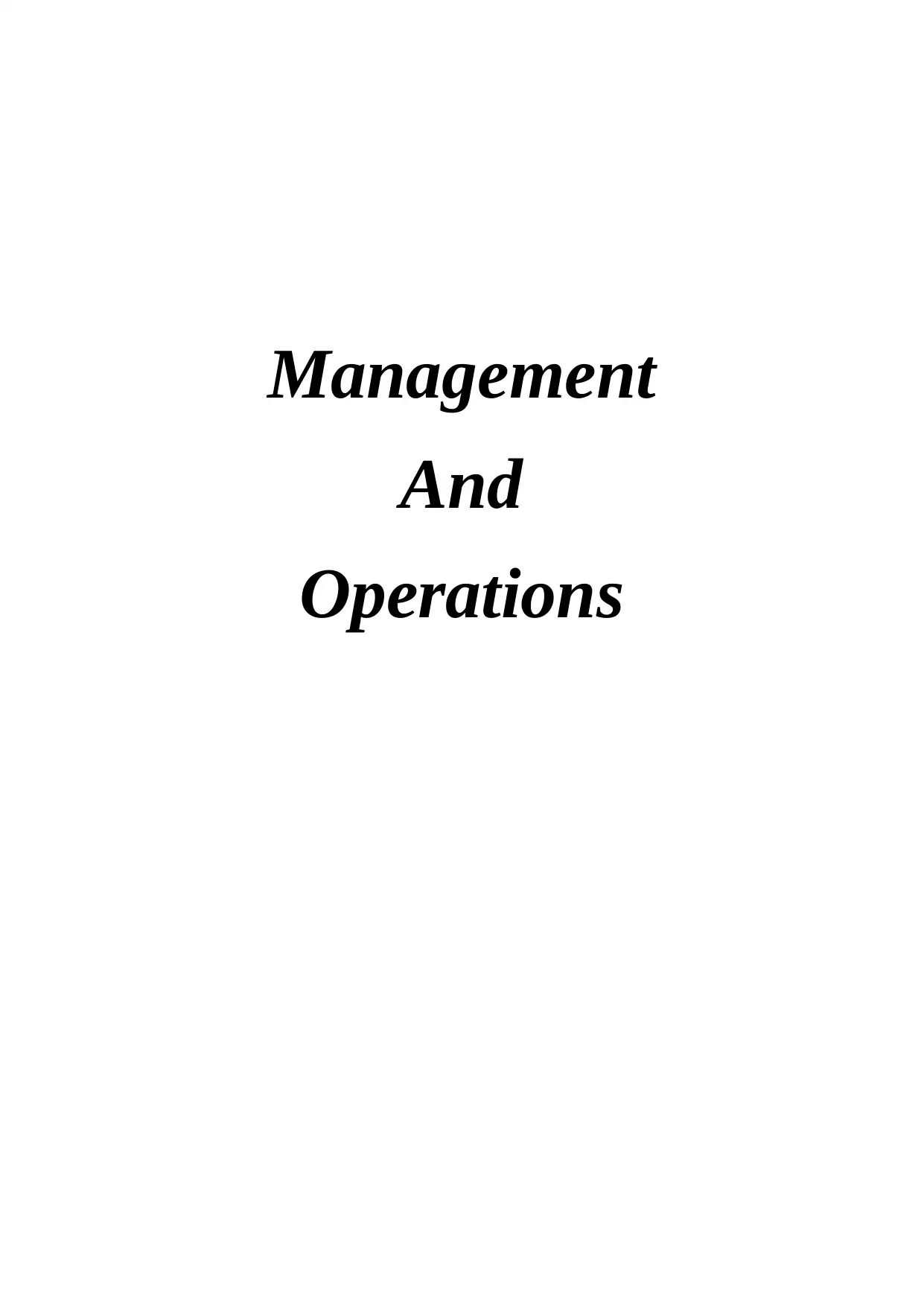
Management
And
Operations
And
Operations
Paraphrase This Document
Need a fresh take? Get an instant paraphrase of this document with our AI Paraphraser
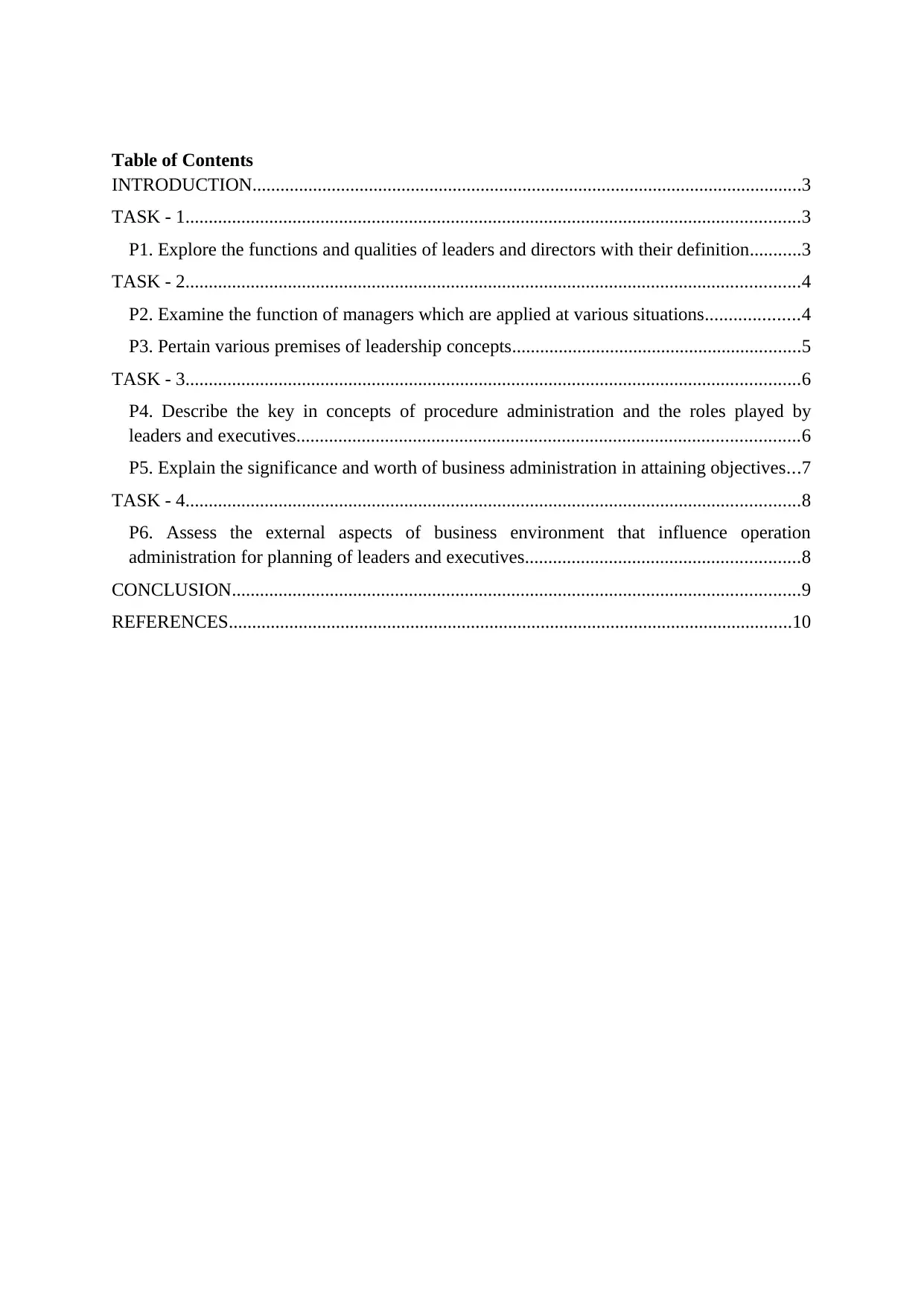
Table of Contents
INTRODUCTION......................................................................................................................3
TASK - 1....................................................................................................................................3
P1. Explore the functions and qualities of leaders and directors with their definition...........3
TASK - 2....................................................................................................................................4
P2. Examine the function of managers which are applied at various situations....................4
P3. Pertain various premises of leadership concepts..............................................................5
TASK - 3....................................................................................................................................6
P4. Describe the key in concepts of procedure administration and the roles played by
leaders and executives............................................................................................................6
P5. Explain the significance and worth of business administration in attaining objectives...7
TASK - 4....................................................................................................................................8
P6. Assess the external aspects of business environment that influence operation
administration for planning of leaders and executives...........................................................8
CONCLUSION..........................................................................................................................9
REFERENCES.........................................................................................................................10
INTRODUCTION......................................................................................................................3
TASK - 1....................................................................................................................................3
P1. Explore the functions and qualities of leaders and directors with their definition...........3
TASK - 2....................................................................................................................................4
P2. Examine the function of managers which are applied at various situations....................4
P3. Pertain various premises of leadership concepts..............................................................5
TASK - 3....................................................................................................................................6
P4. Describe the key in concepts of procedure administration and the roles played by
leaders and executives............................................................................................................6
P5. Explain the significance and worth of business administration in attaining objectives...7
TASK - 4....................................................................................................................................8
P6. Assess the external aspects of business environment that influence operation
administration for planning of leaders and executives...........................................................8
CONCLUSION..........................................................................................................................9
REFERENCES.........................................................................................................................10
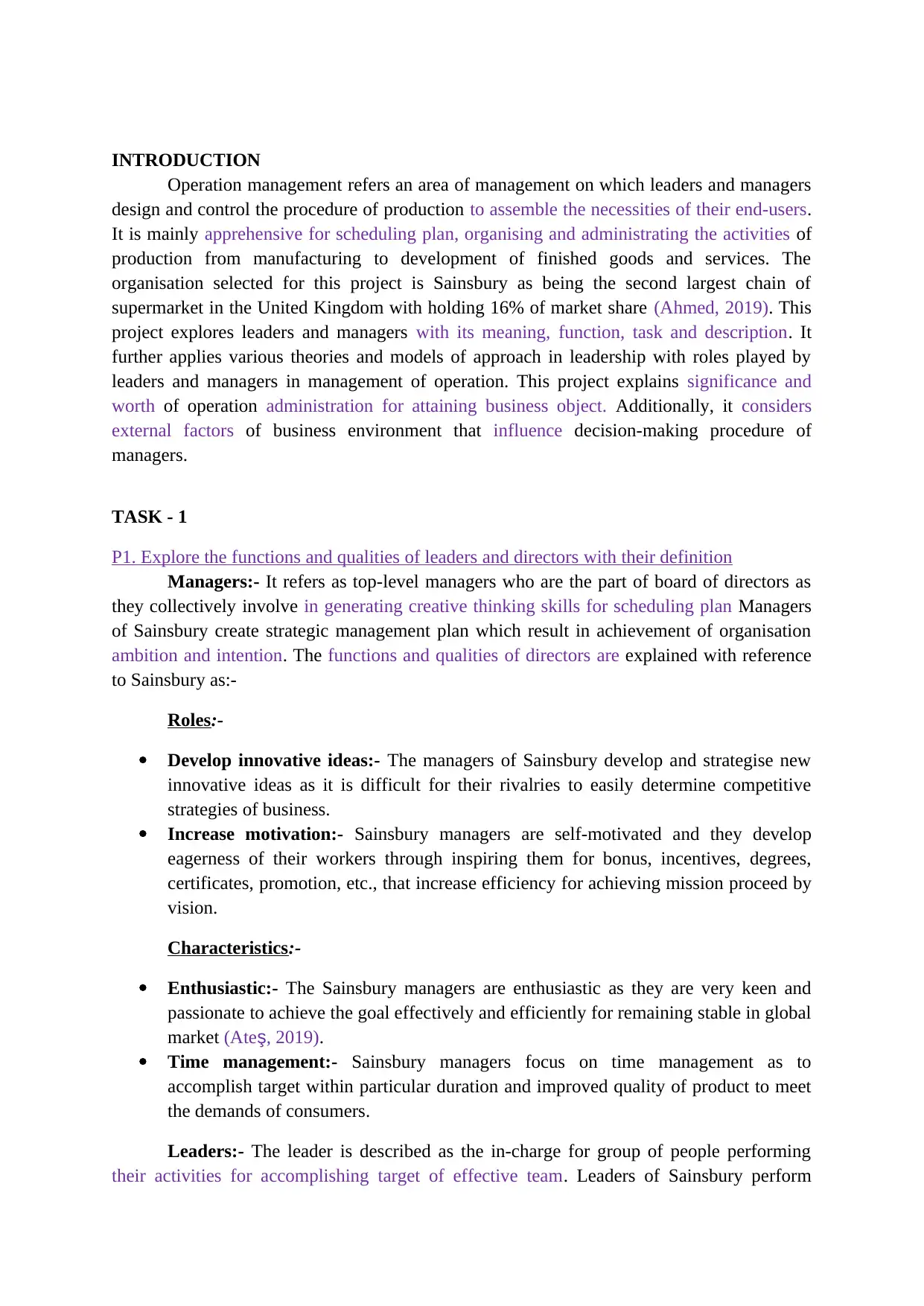
INTRODUCTION
Operation management refers an area of management on which leaders and managers
design and control the procedure of production to assemble the necessities of their end-users.
It is mainly apprehensive for scheduling plan, organising and administrating the activities of
production from manufacturing to development of finished goods and services. The
organisation selected for this project is Sainsbury as being the second largest chain of
supermarket in the United Kingdom with holding 16% of market share (Ahmed, 2019). This
project explores leaders and managers with its meaning, function, task and description. It
further applies various theories and models of approach in leadership with roles played by
leaders and managers in management of operation. This project explains significance and
worth of operation administration for attaining business object. Additionally, it considers
external factors of business environment that influence decision-making procedure of
managers.
TASK - 1
P1. Explore the functions and qualities of leaders and directors with their definition
Managers:- It refers as top-level managers who are the part of board of directors as
they collectively involve in generating creative thinking skills for scheduling plan Managers
of Sainsbury create strategic management plan which result in achievement of organisation
ambition and intention. The functions and qualities of directors are explained with reference
to Sainsbury as:-
Roles:-
Develop innovative ideas:- The managers of Sainsbury develop and strategise new
innovative ideas as it is difficult for their rivalries to easily determine competitive
strategies of business.
Increase motivation:- Sainsbury managers are self-motivated and they develop
eagerness of their workers through inspiring them for bonus, incentives, degrees,
certificates, promotion, etc., that increase efficiency for achieving mission proceed by
vision.
Characteristics:-
Enthusiastic:- The Sainsbury managers are enthusiastic as they are very keen and
passionate to achieve the goal effectively and efficiently for remaining stable in global
market (Ateş, 2019).
Time management:- Sainsbury managers focus on time management as to
accomplish target within particular duration and improved quality of product to meet
the demands of consumers.
Leaders:- The leader is described as the in-charge for group of people performing
their activities for accomplishing target of effective team. Leaders of Sainsbury perform
Operation management refers an area of management on which leaders and managers
design and control the procedure of production to assemble the necessities of their end-users.
It is mainly apprehensive for scheduling plan, organising and administrating the activities of
production from manufacturing to development of finished goods and services. The
organisation selected for this project is Sainsbury as being the second largest chain of
supermarket in the United Kingdom with holding 16% of market share (Ahmed, 2019). This
project explores leaders and managers with its meaning, function, task and description. It
further applies various theories and models of approach in leadership with roles played by
leaders and managers in management of operation. This project explains significance and
worth of operation administration for attaining business object. Additionally, it considers
external factors of business environment that influence decision-making procedure of
managers.
TASK - 1
P1. Explore the functions and qualities of leaders and directors with their definition
Managers:- It refers as top-level managers who are the part of board of directors as
they collectively involve in generating creative thinking skills for scheduling plan Managers
of Sainsbury create strategic management plan which result in achievement of organisation
ambition and intention. The functions and qualities of directors are explained with reference
to Sainsbury as:-
Roles:-
Develop innovative ideas:- The managers of Sainsbury develop and strategise new
innovative ideas as it is difficult for their rivalries to easily determine competitive
strategies of business.
Increase motivation:- Sainsbury managers are self-motivated and they develop
eagerness of their workers through inspiring them for bonus, incentives, degrees,
certificates, promotion, etc., that increase efficiency for achieving mission proceed by
vision.
Characteristics:-
Enthusiastic:- The Sainsbury managers are enthusiastic as they are very keen and
passionate to achieve the goal effectively and efficiently for remaining stable in global
market (Ateş, 2019).
Time management:- Sainsbury managers focus on time management as to
accomplish target within particular duration and improved quality of product to meet
the demands of consumers.
Leaders:- The leader is described as the in-charge for group of people performing
their activities for accomplishing target of effective team. Leaders of Sainsbury perform
⊘ This is a preview!⊘
Do you want full access?
Subscribe today to unlock all pages.

Trusted by 1+ million students worldwide
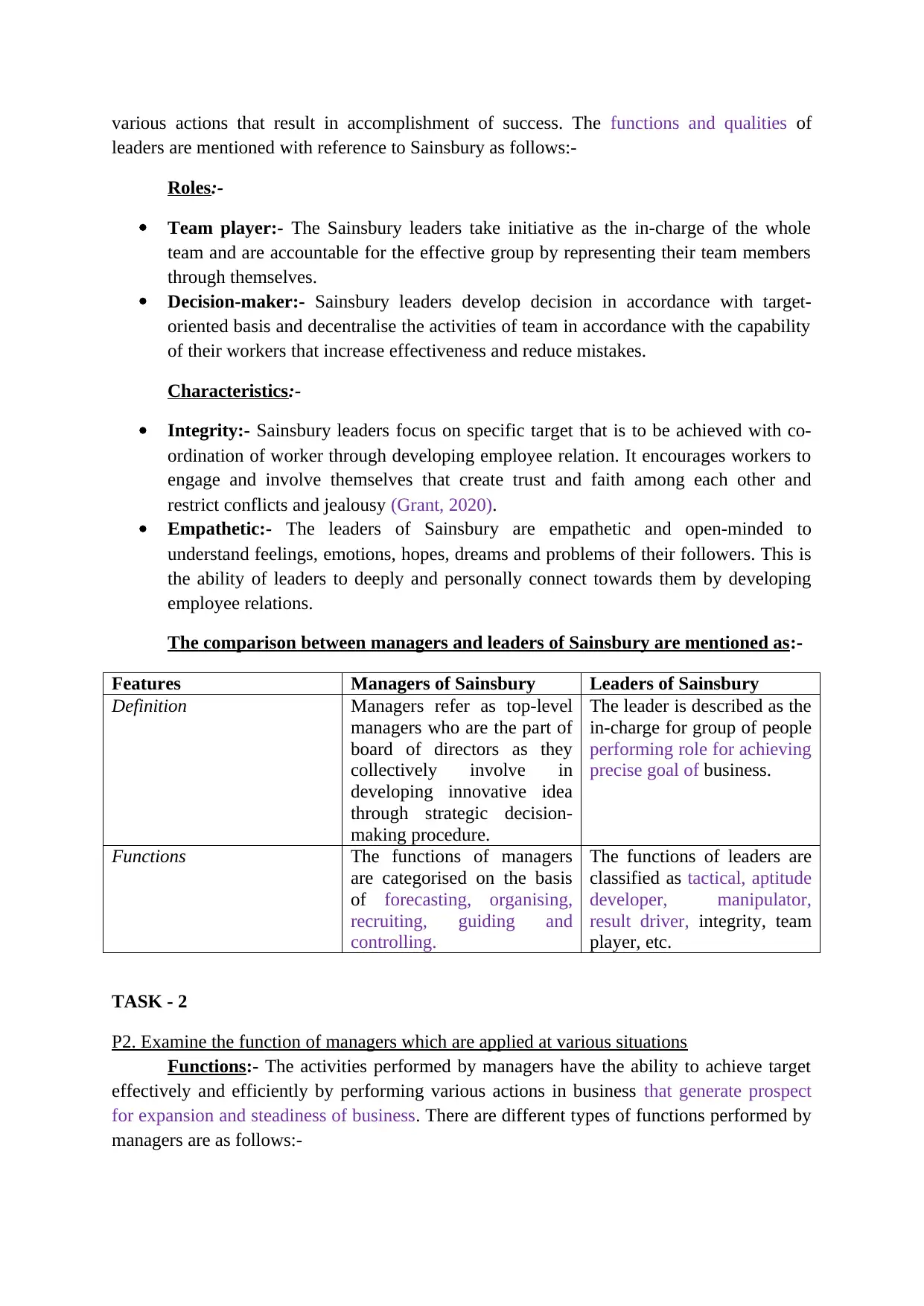
various actions that result in accomplishment of success. The functions and qualities of
leaders are mentioned with reference to Sainsbury as follows:-
Roles:-
Team player:- The Sainsbury leaders take initiative as the in-charge of the whole
team and are accountable for the effective group by representing their team members
through themselves.
Decision-maker:- Sainsbury leaders develop decision in accordance with target-
oriented basis and decentralise the activities of team in accordance with the capability
of their workers that increase effectiveness and reduce mistakes.
Characteristics:-
Integrity:- Sainsbury leaders focus on specific target that is to be achieved with co-
ordination of worker through developing employee relation. It encourages workers to
engage and involve themselves that create trust and faith among each other and
restrict conflicts and jealousy (Grant, 2020).
Empathetic:- The leaders of Sainsbury are empathetic and open-minded to
understand feelings, emotions, hopes, dreams and problems of their followers. This is
the ability of leaders to deeply and personally connect towards them by developing
employee relations.
The comparison between managers and leaders of Sainsbury are mentioned as:-
Features Managers of Sainsbury Leaders of Sainsbury
Definition Managers refer as top-level
managers who are the part of
board of directors as they
collectively involve in
developing innovative idea
through strategic decision-
making procedure.
The leader is described as the
in-charge for group of people
performing role for achieving
precise goal of business.
Functions The functions of managers
are categorised on the basis
of forecasting, organising,
recruiting, guiding and
controlling.
The functions of leaders are
classified as tactical, aptitude
developer, manipulator,
result driver, integrity, team
player, etc.
TASK - 2
P2. Examine the function of managers which are applied at various situations
Functions:- The activities performed by managers have the ability to achieve target
effectively and efficiently by performing various actions in business that generate prospect
for expansion and steadiness of business. There are different types of functions performed by
managers are as follows:-
leaders are mentioned with reference to Sainsbury as follows:-
Roles:-
Team player:- The Sainsbury leaders take initiative as the in-charge of the whole
team and are accountable for the effective group by representing their team members
through themselves.
Decision-maker:- Sainsbury leaders develop decision in accordance with target-
oriented basis and decentralise the activities of team in accordance with the capability
of their workers that increase effectiveness and reduce mistakes.
Characteristics:-
Integrity:- Sainsbury leaders focus on specific target that is to be achieved with co-
ordination of worker through developing employee relation. It encourages workers to
engage and involve themselves that create trust and faith among each other and
restrict conflicts and jealousy (Grant, 2020).
Empathetic:- The leaders of Sainsbury are empathetic and open-minded to
understand feelings, emotions, hopes, dreams and problems of their followers. This is
the ability of leaders to deeply and personally connect towards them by developing
employee relations.
The comparison between managers and leaders of Sainsbury are mentioned as:-
Features Managers of Sainsbury Leaders of Sainsbury
Definition Managers refer as top-level
managers who are the part of
board of directors as they
collectively involve in
developing innovative idea
through strategic decision-
making procedure.
The leader is described as the
in-charge for group of people
performing role for achieving
precise goal of business.
Functions The functions of managers
are categorised on the basis
of forecasting, organising,
recruiting, guiding and
controlling.
The functions of leaders are
classified as tactical, aptitude
developer, manipulator,
result driver, integrity, team
player, etc.
TASK - 2
P2. Examine the function of managers which are applied at various situations
Functions:- The activities performed by managers have the ability to achieve target
effectively and efficiently by performing various actions in business that generate prospect
for expansion and steadiness of business. There are different types of functions performed by
managers are as follows:-
Paraphrase This Document
Need a fresh take? Get an instant paraphrase of this document with our AI Paraphraser
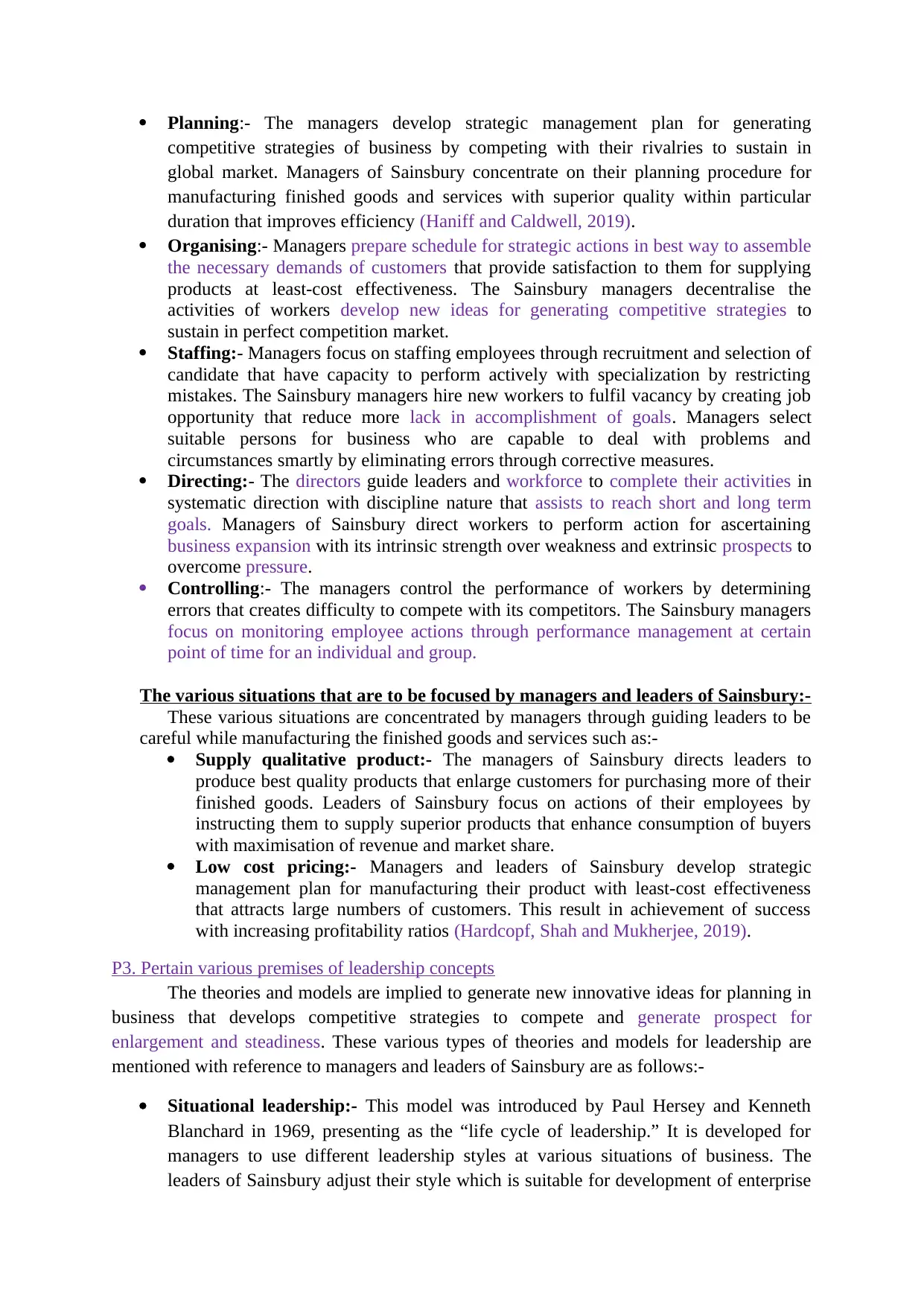
Planning:- The managers develop strategic management plan for generating
competitive strategies of business by competing with their rivalries to sustain in
global market. Managers of Sainsbury concentrate on their planning procedure for
manufacturing finished goods and services with superior quality within particular
duration that improves efficiency (Haniff and Caldwell, 2019).
Organising:- Managers prepare schedule for strategic actions in best way to assemble
the necessary demands of customers that provide satisfaction to them for supplying
products at least-cost effectiveness. The Sainsbury managers decentralise the
activities of workers develop new ideas for generating competitive strategies to
sustain in perfect competition market.
Staffing:- Managers focus on staffing employees through recruitment and selection of
candidate that have capacity to perform actively with specialization by restricting
mistakes. The Sainsbury managers hire new workers to fulfil vacancy by creating job
opportunity that reduce more lack in accomplishment of goals. Managers select
suitable persons for business who are capable to deal with problems and
circumstances smartly by eliminating errors through corrective measures.
Directing:- The directors guide leaders and workforce to complete their activities in
systematic direction with discipline nature that assists to reach short and long term
goals. Managers of Sainsbury direct workers to perform action for ascertaining
business expansion with its intrinsic strength over weakness and extrinsic prospects to
overcome pressure.
Controlling:- The managers control the performance of workers by determining
errors that creates difficulty to compete with its competitors. The Sainsbury managers
focus on monitoring employee actions through performance management at certain
point of time for an individual and group.
The various situations that are to be focused by managers and leaders of Sainsbury:-
These various situations are concentrated by managers through guiding leaders to be
careful while manufacturing the finished goods and services such as:-
Supply qualitative product:- The managers of Sainsbury directs leaders to
produce best quality products that enlarge customers for purchasing more of their
finished goods. Leaders of Sainsbury focus on actions of their employees by
instructing them to supply superior products that enhance consumption of buyers
with maximisation of revenue and market share.
Low cost pricing:- Managers and leaders of Sainsbury develop strategic
management plan for manufacturing their product with least-cost effectiveness
that attracts large numbers of customers. This result in achievement of success
with increasing profitability ratios (Hardcopf, Shah and Mukherjee, 2019).
P3. Pertain various premises of leadership concepts
The theories and models are implied to generate new innovative ideas for planning in
business that develops competitive strategies to compete and generate prospect for
enlargement and steadiness. These various types of theories and models for leadership are
mentioned with reference to managers and leaders of Sainsbury are as follows:-
Situational leadership:- This model was introduced by Paul Hersey and Kenneth
Blanchard in 1969, presenting as the “life cycle of leadership.” It is developed for
managers to use different leadership styles at various situations of business. The
leaders of Sainsbury adjust their style which is suitable for development of enterprise
competitive strategies of business by competing with their rivalries to sustain in
global market. Managers of Sainsbury concentrate on their planning procedure for
manufacturing finished goods and services with superior quality within particular
duration that improves efficiency (Haniff and Caldwell, 2019).
Organising:- Managers prepare schedule for strategic actions in best way to assemble
the necessary demands of customers that provide satisfaction to them for supplying
products at least-cost effectiveness. The Sainsbury managers decentralise the
activities of workers develop new ideas for generating competitive strategies to
sustain in perfect competition market.
Staffing:- Managers focus on staffing employees through recruitment and selection of
candidate that have capacity to perform actively with specialization by restricting
mistakes. The Sainsbury managers hire new workers to fulfil vacancy by creating job
opportunity that reduce more lack in accomplishment of goals. Managers select
suitable persons for business who are capable to deal with problems and
circumstances smartly by eliminating errors through corrective measures.
Directing:- The directors guide leaders and workforce to complete their activities in
systematic direction with discipline nature that assists to reach short and long term
goals. Managers of Sainsbury direct workers to perform action for ascertaining
business expansion with its intrinsic strength over weakness and extrinsic prospects to
overcome pressure.
Controlling:- The managers control the performance of workers by determining
errors that creates difficulty to compete with its competitors. The Sainsbury managers
focus on monitoring employee actions through performance management at certain
point of time for an individual and group.
The various situations that are to be focused by managers and leaders of Sainsbury:-
These various situations are concentrated by managers through guiding leaders to be
careful while manufacturing the finished goods and services such as:-
Supply qualitative product:- The managers of Sainsbury directs leaders to
produce best quality products that enlarge customers for purchasing more of their
finished goods. Leaders of Sainsbury focus on actions of their employees by
instructing them to supply superior products that enhance consumption of buyers
with maximisation of revenue and market share.
Low cost pricing:- Managers and leaders of Sainsbury develop strategic
management plan for manufacturing their product with least-cost effectiveness
that attracts large numbers of customers. This result in achievement of success
with increasing profitability ratios (Hardcopf, Shah and Mukherjee, 2019).
P3. Pertain various premises of leadership concepts
The theories and models are implied to generate new innovative ideas for planning in
business that develops competitive strategies to compete and generate prospect for
enlargement and steadiness. These various types of theories and models for leadership are
mentioned with reference to managers and leaders of Sainsbury are as follows:-
Situational leadership:- This model was introduced by Paul Hersey and Kenneth
Blanchard in 1969, presenting as the “life cycle of leadership.” It is developed for
managers to use different leadership styles at various situations of business. The
leaders of Sainsbury adjust their style which is suitable for development of enterprise
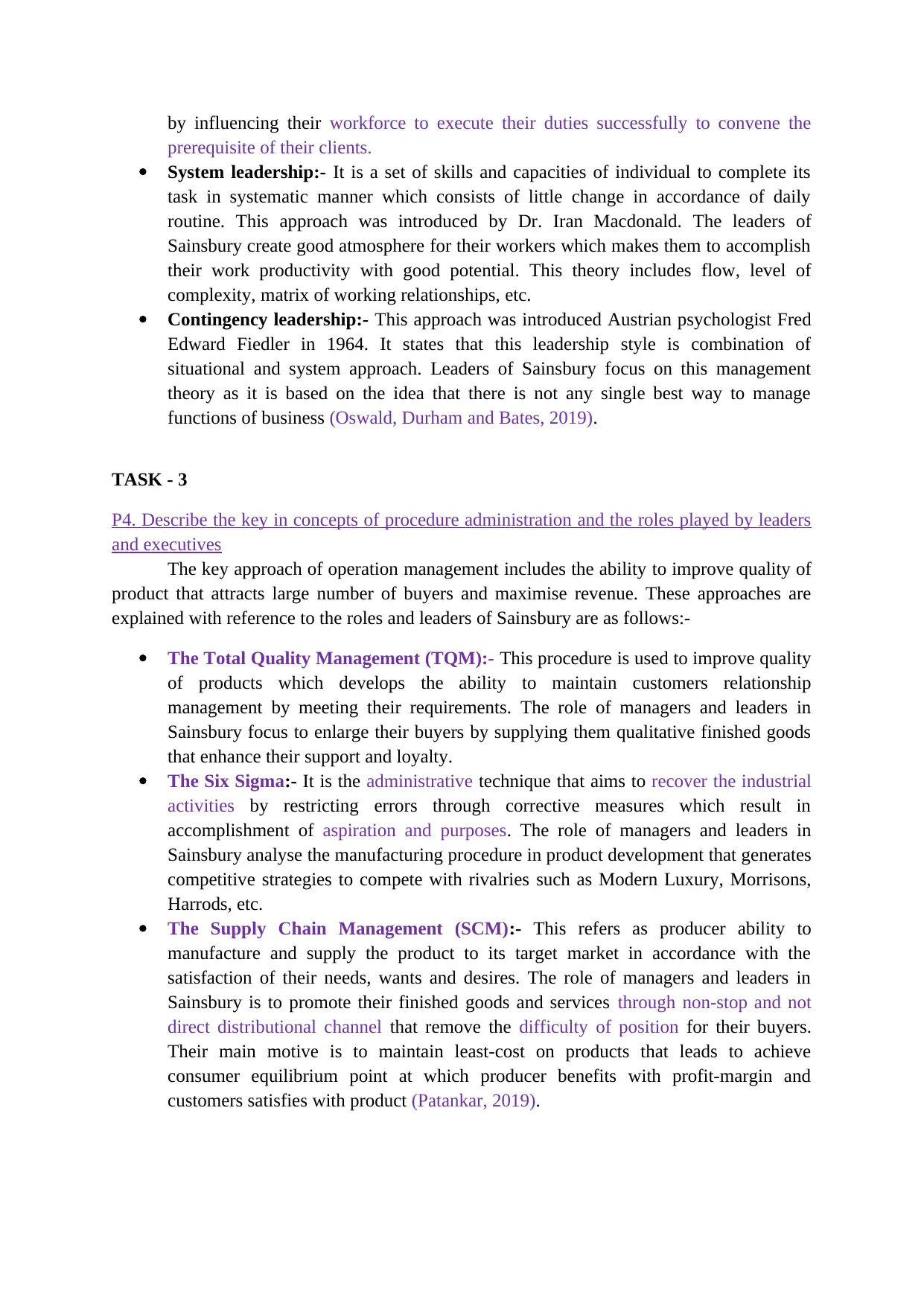
by influencing their workforce to execute their duties successfully to convene the
prerequisite of their clients.
System leadership:- It is a set of skills and capacities of individual to complete its
task in systematic manner which consists of little change in accordance of daily
routine. This approach was introduced by Dr. Iran Macdonald. The leaders of
Sainsbury create good atmosphere for their workers which makes them to accomplish
their work productivity with good potential. This theory includes flow, level of
complexity, matrix of working relationships, etc.
Contingency leadership:- This approach was introduced Austrian psychologist Fred
Edward Fiedler in 1964. It states that this leadership style is combination of
situational and system approach. Leaders of Sainsbury focus on this management
theory as it is based on the idea that there is not any single best way to manage
functions of business (Oswald, Durham and Bates, 2019).
TASK - 3
P4. Describe the key in concepts of procedure administration and the roles played by leaders
and executives
The key approach of operation management includes the ability to improve quality of
product that attracts large number of buyers and maximise revenue. These approaches are
explained with reference to the roles and leaders of Sainsbury are as follows:-
The Total Quality Management (TQM):- This procedure is used to improve quality
of products which develops the ability to maintain customers relationship
management by meeting their requirements. The role of managers and leaders in
Sainsbury focus to enlarge their buyers by supplying them qualitative finished goods
that enhance their support and loyalty.
The Six Sigma:- It is the administrative technique that aims to recover the industrial
activities by restricting errors through corrective measures which result in
accomplishment of aspiration and purposes. The role of managers and leaders in
Sainsbury analyse the manufacturing procedure in product development that generates
competitive strategies to compete with rivalries such as Modern Luxury, Morrisons,
Harrods, etc.
The Supply Chain Management (SCM):- This refers as producer ability to
manufacture and supply the product to its target market in accordance with the
satisfaction of their needs, wants and desires. The role of managers and leaders in
Sainsbury is to promote their finished goods and services through non-stop and not
direct distributional channel that remove the difficulty of position for their buyers.
Their main motive is to maintain least-cost on products that leads to achieve
consumer equilibrium point at which producer benefits with profit-margin and
customers satisfies with product (Patankar, 2019).
prerequisite of their clients.
System leadership:- It is a set of skills and capacities of individual to complete its
task in systematic manner which consists of little change in accordance of daily
routine. This approach was introduced by Dr. Iran Macdonald. The leaders of
Sainsbury create good atmosphere for their workers which makes them to accomplish
their work productivity with good potential. This theory includes flow, level of
complexity, matrix of working relationships, etc.
Contingency leadership:- This approach was introduced Austrian psychologist Fred
Edward Fiedler in 1964. It states that this leadership style is combination of
situational and system approach. Leaders of Sainsbury focus on this management
theory as it is based on the idea that there is not any single best way to manage
functions of business (Oswald, Durham and Bates, 2019).
TASK - 3
P4. Describe the key in concepts of procedure administration and the roles played by leaders
and executives
The key approach of operation management includes the ability to improve quality of
product that attracts large number of buyers and maximise revenue. These approaches are
explained with reference to the roles and leaders of Sainsbury are as follows:-
The Total Quality Management (TQM):- This procedure is used to improve quality
of products which develops the ability to maintain customers relationship
management by meeting their requirements. The role of managers and leaders in
Sainsbury focus to enlarge their buyers by supplying them qualitative finished goods
that enhance their support and loyalty.
The Six Sigma:- It is the administrative technique that aims to recover the industrial
activities by restricting errors through corrective measures which result in
accomplishment of aspiration and purposes. The role of managers and leaders in
Sainsbury analyse the manufacturing procedure in product development that generates
competitive strategies to compete with rivalries such as Modern Luxury, Morrisons,
Harrods, etc.
The Supply Chain Management (SCM):- This refers as producer ability to
manufacture and supply the product to its target market in accordance with the
satisfaction of their needs, wants and desires. The role of managers and leaders in
Sainsbury is to promote their finished goods and services through non-stop and not
direct distributional channel that remove the difficulty of position for their buyers.
Their main motive is to maintain least-cost on products that leads to achieve
consumer equilibrium point at which producer benefits with profit-margin and
customers satisfies with product (Patankar, 2019).
⊘ This is a preview!⊘
Do you want full access?
Subscribe today to unlock all pages.

Trusted by 1+ million students worldwide
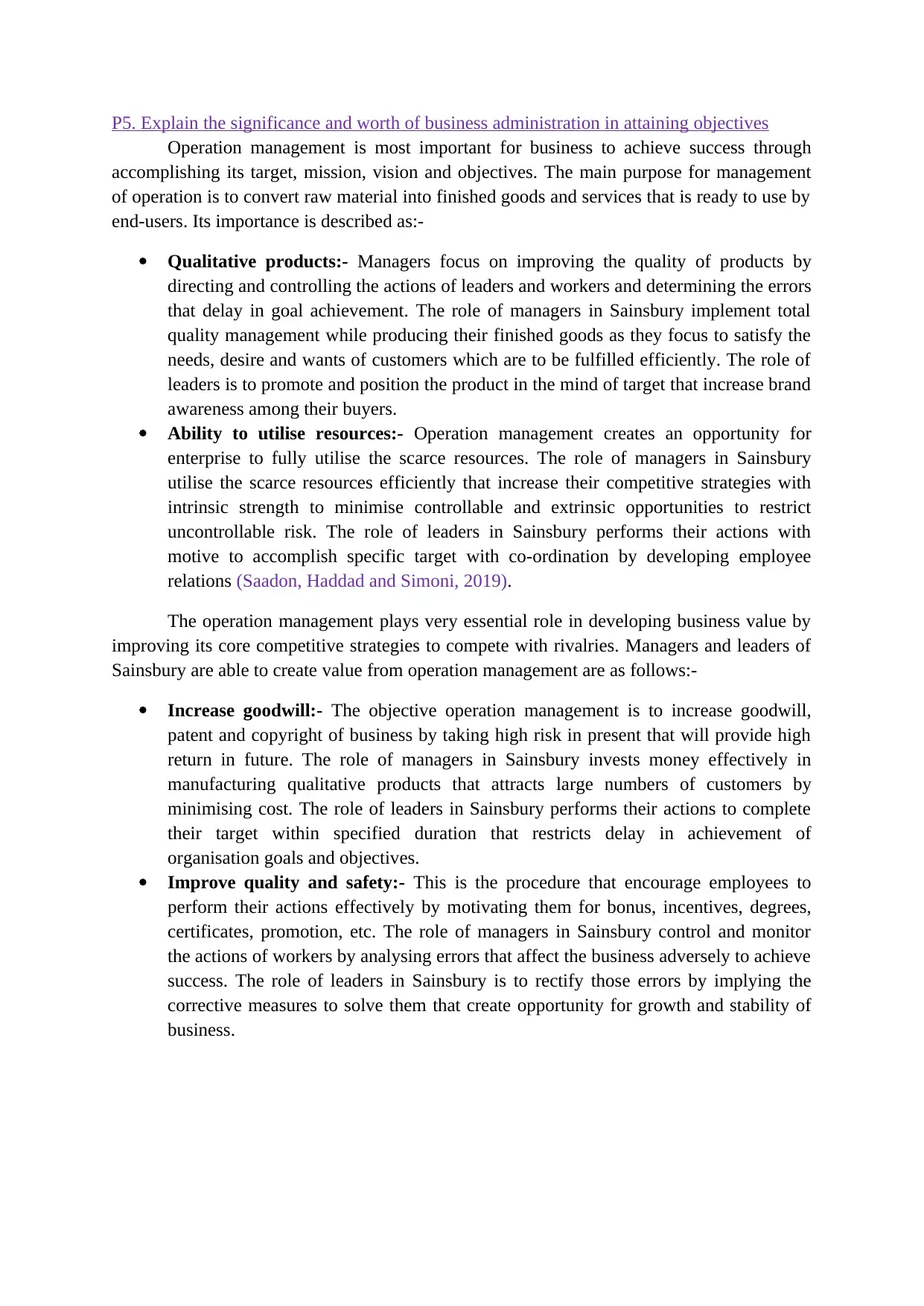
P5. Explain the significance and worth of business administration in attaining objectives
Operation management is most important for business to achieve success through
accomplishing its target, mission, vision and objectives. The main purpose for management
of operation is to convert raw material into finished goods and services that is ready to use by
end-users. Its importance is described as:-
Qualitative products:- Managers focus on improving the quality of products by
directing and controlling the actions of leaders and workers and determining the errors
that delay in goal achievement. The role of managers in Sainsbury implement total
quality management while producing their finished goods as they focus to satisfy the
needs, desire and wants of customers which are to be fulfilled efficiently. The role of
leaders is to promote and position the product in the mind of target that increase brand
awareness among their buyers.
Ability to utilise resources:- Operation management creates an opportunity for
enterprise to fully utilise the scarce resources. The role of managers in Sainsbury
utilise the scarce resources efficiently that increase their competitive strategies with
intrinsic strength to minimise controllable and extrinsic opportunities to restrict
uncontrollable risk. The role of leaders in Sainsbury performs their actions with
motive to accomplish specific target with co-ordination by developing employee
relations (Saadon, Haddad and Simoni, 2019).
The operation management plays very essential role in developing business value by
improving its core competitive strategies to compete with rivalries. Managers and leaders of
Sainsbury are able to create value from operation management are as follows:-
Increase goodwill:- The objective operation management is to increase goodwill,
patent and copyright of business by taking high risk in present that will provide high
return in future. The role of managers in Sainsbury invests money effectively in
manufacturing qualitative products that attracts large numbers of customers by
minimising cost. The role of leaders in Sainsbury performs their actions to complete
their target within specified duration that restricts delay in achievement of
organisation goals and objectives.
Improve quality and safety:- This is the procedure that encourage employees to
perform their actions effectively by motivating them for bonus, incentives, degrees,
certificates, promotion, etc. The role of managers in Sainsbury control and monitor
the actions of workers by analysing errors that affect the business adversely to achieve
success. The role of leaders in Sainsbury is to rectify those errors by implying the
corrective measures to solve them that create opportunity for growth and stability of
business.
Operation management is most important for business to achieve success through
accomplishing its target, mission, vision and objectives. The main purpose for management
of operation is to convert raw material into finished goods and services that is ready to use by
end-users. Its importance is described as:-
Qualitative products:- Managers focus on improving the quality of products by
directing and controlling the actions of leaders and workers and determining the errors
that delay in goal achievement. The role of managers in Sainsbury implement total
quality management while producing their finished goods as they focus to satisfy the
needs, desire and wants of customers which are to be fulfilled efficiently. The role of
leaders is to promote and position the product in the mind of target that increase brand
awareness among their buyers.
Ability to utilise resources:- Operation management creates an opportunity for
enterprise to fully utilise the scarce resources. The role of managers in Sainsbury
utilise the scarce resources efficiently that increase their competitive strategies with
intrinsic strength to minimise controllable and extrinsic opportunities to restrict
uncontrollable risk. The role of leaders in Sainsbury performs their actions with
motive to accomplish specific target with co-ordination by developing employee
relations (Saadon, Haddad and Simoni, 2019).
The operation management plays very essential role in developing business value by
improving its core competitive strategies to compete with rivalries. Managers and leaders of
Sainsbury are able to create value from operation management are as follows:-
Increase goodwill:- The objective operation management is to increase goodwill,
patent and copyright of business by taking high risk in present that will provide high
return in future. The role of managers in Sainsbury invests money effectively in
manufacturing qualitative products that attracts large numbers of customers by
minimising cost. The role of leaders in Sainsbury performs their actions to complete
their target within specified duration that restricts delay in achievement of
organisation goals and objectives.
Improve quality and safety:- This is the procedure that encourage employees to
perform their actions effectively by motivating them for bonus, incentives, degrees,
certificates, promotion, etc. The role of managers in Sainsbury control and monitor
the actions of workers by analysing errors that affect the business adversely to achieve
success. The role of leaders in Sainsbury is to rectify those errors by implying the
corrective measures to solve them that create opportunity for growth and stability of
business.
Paraphrase This Document
Need a fresh take? Get an instant paraphrase of this document with our AI Paraphraser
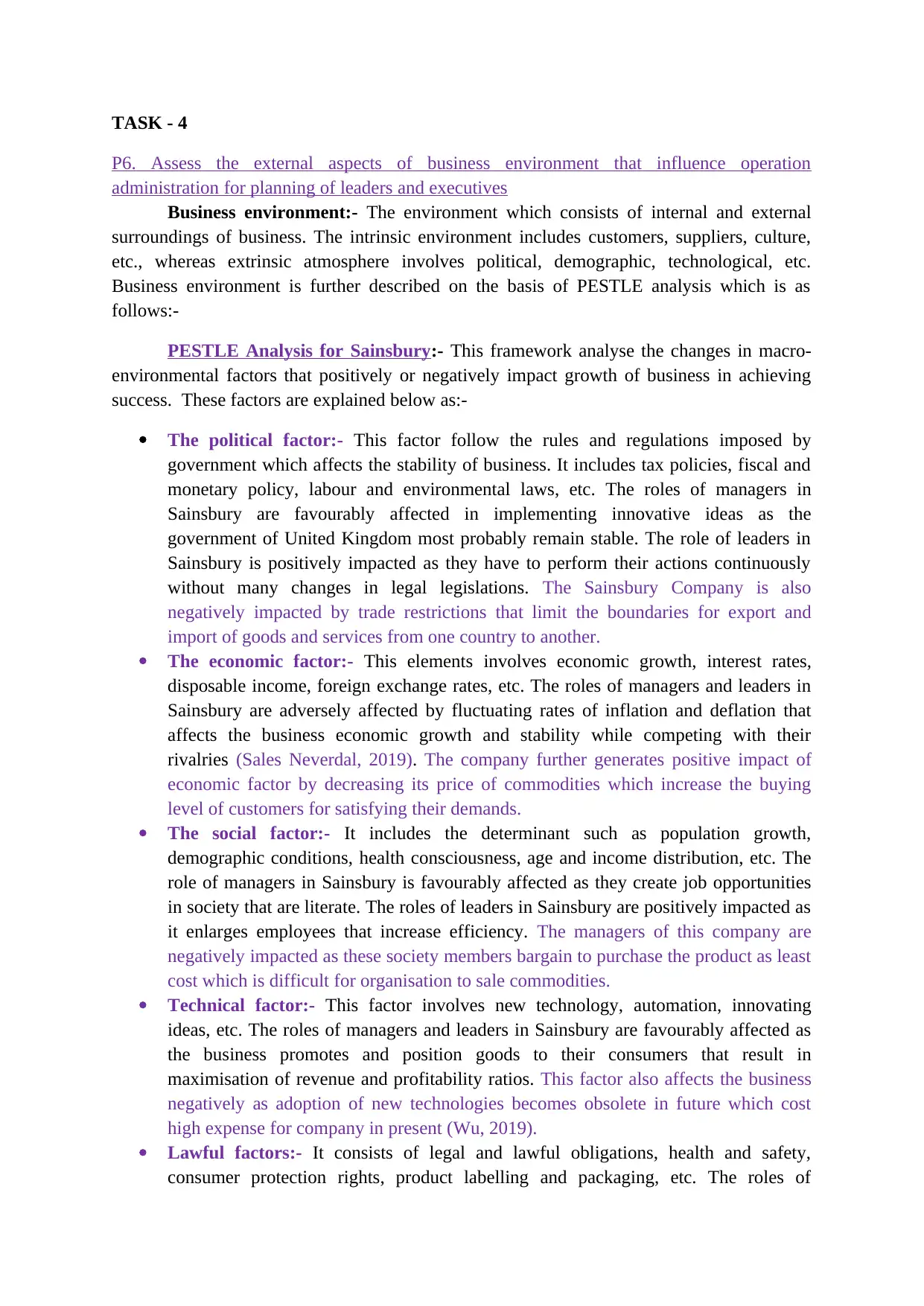
TASK - 4
P6. Assess the external aspects of business environment that influence operation
administration for planning of leaders and executives
Business environment:- The environment which consists of internal and external
surroundings of business. The intrinsic environment includes customers, suppliers, culture,
etc., whereas extrinsic atmosphere involves political, demographic, technological, etc.
Business environment is further described on the basis of PESTLE analysis which is as
follows:-
PESTLE Analysis for Sainsbury:- This framework analyse the changes in macro-
environmental factors that positively or negatively impact growth of business in achieving
success. These factors are explained below as:-
The political factor:- This factor follow the rules and regulations imposed by
government which affects the stability of business. It includes tax policies, fiscal and
monetary policy, labour and environmental laws, etc. The roles of managers in
Sainsbury are favourably affected in implementing innovative ideas as the
government of United Kingdom most probably remain stable. The role of leaders in
Sainsbury is positively impacted as they have to perform their actions continuously
without many changes in legal legislations. The Sainsbury Company is also
negatively impacted by trade restrictions that limit the boundaries for export and
import of goods and services from one country to another.
The economic factor:- This elements involves economic growth, interest rates,
disposable income, foreign exchange rates, etc. The roles of managers and leaders in
Sainsbury are adversely affected by fluctuating rates of inflation and deflation that
affects the business economic growth and stability while competing with their
rivalries (Sales Neverdal, 2019). The company further generates positive impact of
economic factor by decreasing its price of commodities which increase the buying
level of customers for satisfying their demands.
The social factor:- It includes the determinant such as population growth,
demographic conditions, health consciousness, age and income distribution, etc. The
role of managers in Sainsbury is favourably affected as they create job opportunities
in society that are literate. The roles of leaders in Sainsbury are positively impacted as
it enlarges employees that increase efficiency. The managers of this company are
negatively impacted as these society members bargain to purchase the product as least
cost which is difficult for organisation to sale commodities.
Technical factor:- This factor involves new technology, automation, innovating
ideas, etc. The roles of managers and leaders in Sainsbury are favourably affected as
the business promotes and position goods to their consumers that result in
maximisation of revenue and profitability ratios. This factor also affects the business
negatively as adoption of new technologies becomes obsolete in future which cost
high expense for company in present (Wu, 2019).
Lawful factors:- It consists of legal and lawful obligations, health and safety,
consumer protection rights, product labelling and packaging, etc. The roles of
P6. Assess the external aspects of business environment that influence operation
administration for planning of leaders and executives
Business environment:- The environment which consists of internal and external
surroundings of business. The intrinsic environment includes customers, suppliers, culture,
etc., whereas extrinsic atmosphere involves political, demographic, technological, etc.
Business environment is further described on the basis of PESTLE analysis which is as
follows:-
PESTLE Analysis for Sainsbury:- This framework analyse the changes in macro-
environmental factors that positively or negatively impact growth of business in achieving
success. These factors are explained below as:-
The political factor:- This factor follow the rules and regulations imposed by
government which affects the stability of business. It includes tax policies, fiscal and
monetary policy, labour and environmental laws, etc. The roles of managers in
Sainsbury are favourably affected in implementing innovative ideas as the
government of United Kingdom most probably remain stable. The role of leaders in
Sainsbury is positively impacted as they have to perform their actions continuously
without many changes in legal legislations. The Sainsbury Company is also
negatively impacted by trade restrictions that limit the boundaries for export and
import of goods and services from one country to another.
The economic factor:- This elements involves economic growth, interest rates,
disposable income, foreign exchange rates, etc. The roles of managers and leaders in
Sainsbury are adversely affected by fluctuating rates of inflation and deflation that
affects the business economic growth and stability while competing with their
rivalries (Sales Neverdal, 2019). The company further generates positive impact of
economic factor by decreasing its price of commodities which increase the buying
level of customers for satisfying their demands.
The social factor:- It includes the determinant such as population growth,
demographic conditions, health consciousness, age and income distribution, etc. The
role of managers in Sainsbury is favourably affected as they create job opportunities
in society that are literate. The roles of leaders in Sainsbury are positively impacted as
it enlarges employees that increase efficiency. The managers of this company are
negatively impacted as these society members bargain to purchase the product as least
cost which is difficult for organisation to sale commodities.
Technical factor:- This factor involves new technology, automation, innovating
ideas, etc. The roles of managers and leaders in Sainsbury are favourably affected as
the business promotes and position goods to their consumers that result in
maximisation of revenue and profitability ratios. This factor also affects the business
negatively as adoption of new technologies becomes obsolete in future which cost
high expense for company in present (Wu, 2019).
Lawful factors:- It consists of legal and lawful obligations, health and safety,
consumer protection rights, product labelling and packaging, etc. The roles of
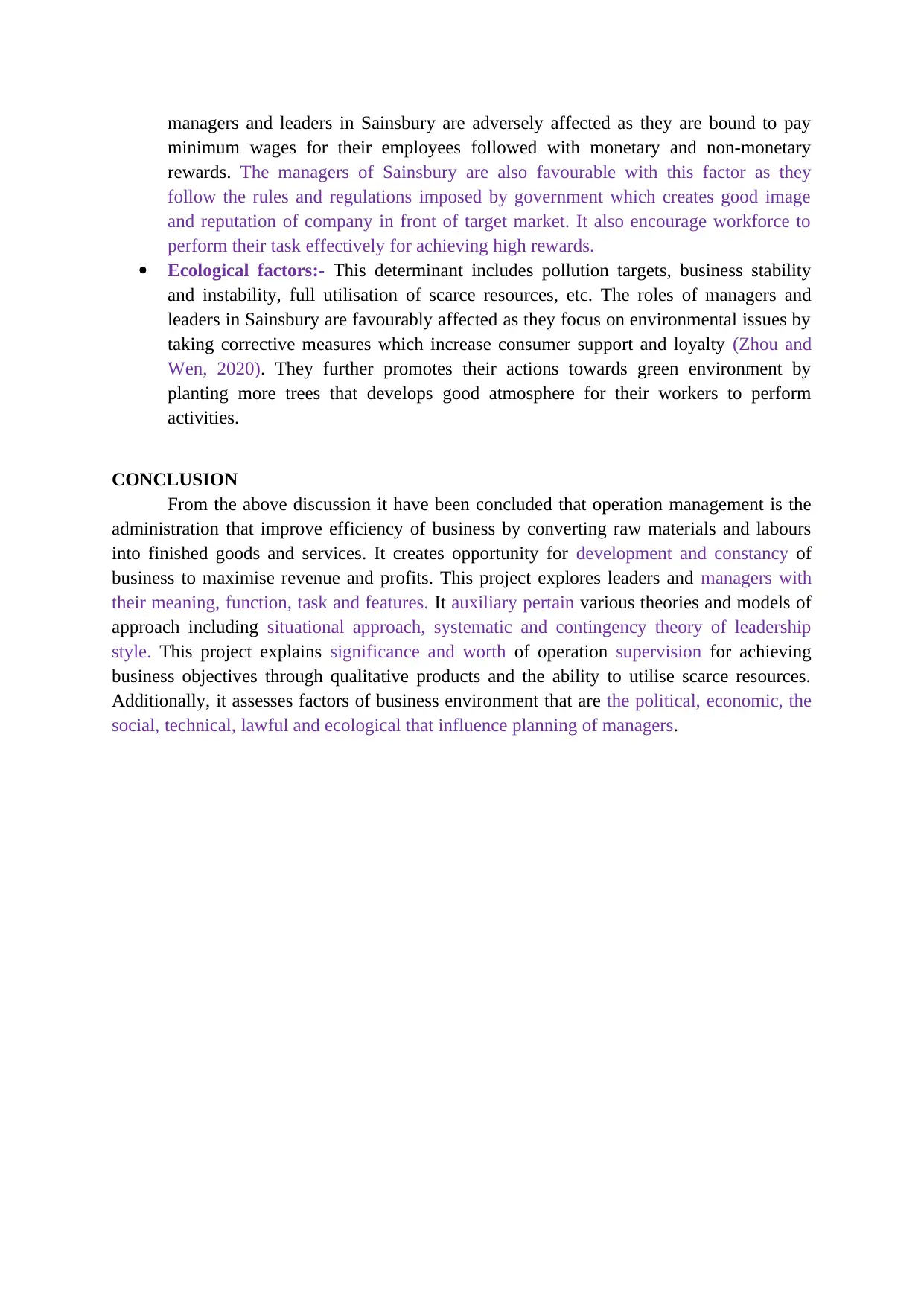
managers and leaders in Sainsbury are adversely affected as they are bound to pay
minimum wages for their employees followed with monetary and non-monetary
rewards. The managers of Sainsbury are also favourable with this factor as they
follow the rules and regulations imposed by government which creates good image
and reputation of company in front of target market. It also encourage workforce to
perform their task effectively for achieving high rewards.
Ecological factors:- This determinant includes pollution targets, business stability
and instability, full utilisation of scarce resources, etc. The roles of managers and
leaders in Sainsbury are favourably affected as they focus on environmental issues by
taking corrective measures which increase consumer support and loyalty (Zhou and
Wen, 2020). They further promotes their actions towards green environment by
planting more trees that develops good atmosphere for their workers to perform
activities.
CONCLUSION
From the above discussion it have been concluded that operation management is the
administration that improve efficiency of business by converting raw materials and labours
into finished goods and services. It creates opportunity for development and constancy of
business to maximise revenue and profits. This project explores leaders and managers with
their meaning, function, task and features. It auxiliary pertain various theories and models of
approach including situational approach, systematic and contingency theory of leadership
style. This project explains significance and worth of operation supervision for achieving
business objectives through qualitative products and the ability to utilise scarce resources.
Additionally, it assesses factors of business environment that are the political, economic, the
social, technical, lawful and ecological that influence planning of managers.
minimum wages for their employees followed with monetary and non-monetary
rewards. The managers of Sainsbury are also favourable with this factor as they
follow the rules and regulations imposed by government which creates good image
and reputation of company in front of target market. It also encourage workforce to
perform their task effectively for achieving high rewards.
Ecological factors:- This determinant includes pollution targets, business stability
and instability, full utilisation of scarce resources, etc. The roles of managers and
leaders in Sainsbury are favourably affected as they focus on environmental issues by
taking corrective measures which increase consumer support and loyalty (Zhou and
Wen, 2020). They further promotes their actions towards green environment by
planting more trees that develops good atmosphere for their workers to perform
activities.
CONCLUSION
From the above discussion it have been concluded that operation management is the
administration that improve efficiency of business by converting raw materials and labours
into finished goods and services. It creates opportunity for development and constancy of
business to maximise revenue and profits. This project explores leaders and managers with
their meaning, function, task and features. It auxiliary pertain various theories and models of
approach including situational approach, systematic and contingency theory of leadership
style. This project explains significance and worth of operation supervision for achieving
business objectives through qualitative products and the ability to utilise scarce resources.
Additionally, it assesses factors of business environment that are the political, economic, the
social, technical, lawful and ecological that influence planning of managers.
⊘ This is a preview!⊘
Do you want full access?
Subscribe today to unlock all pages.

Trusted by 1+ million students worldwide
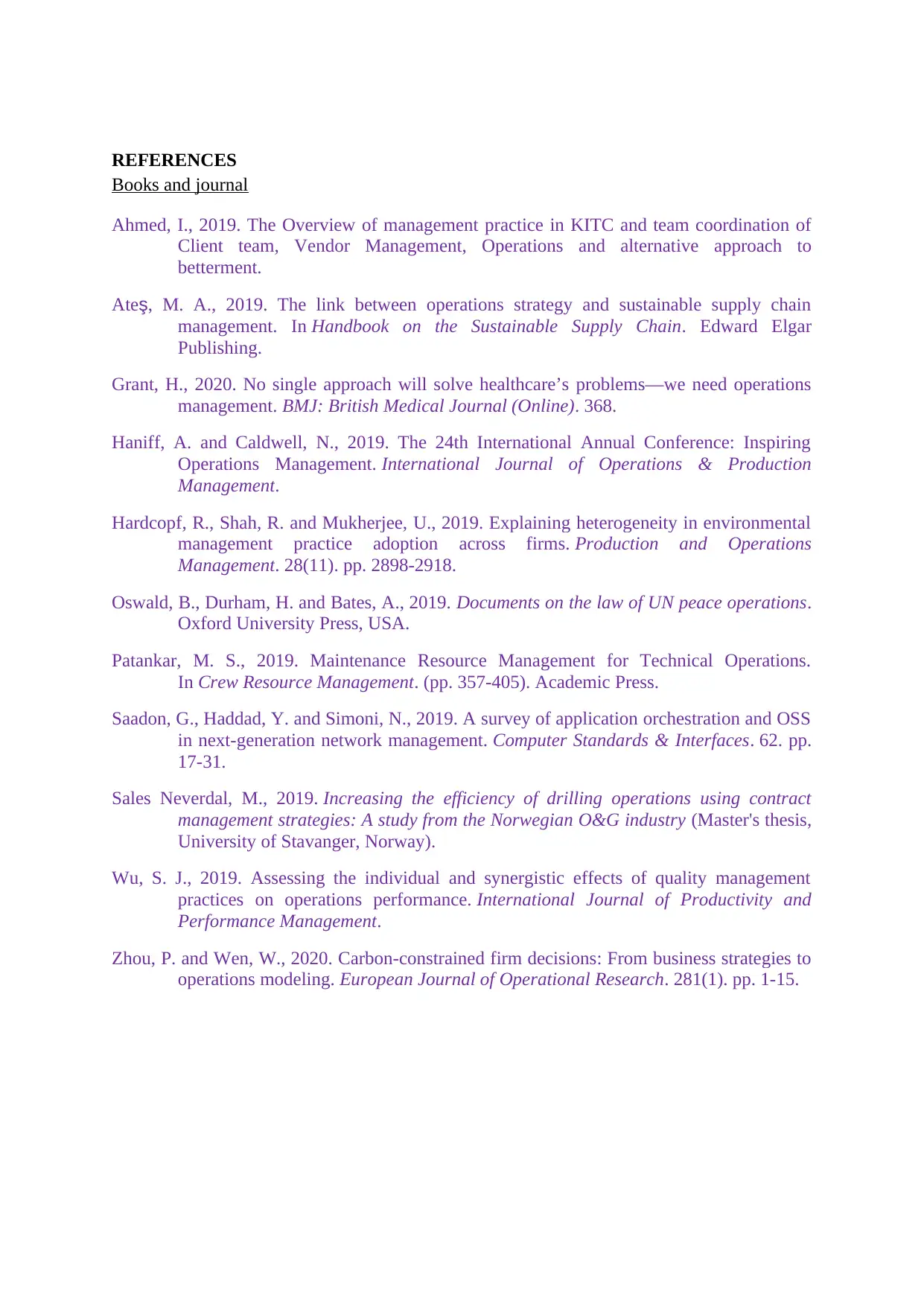
REFERENCES
Books and journal
Ahmed, I., 2019. The Overview of management practice in KITC and team coordination of
Client team, Vendor Management, Operations and alternative approach to
betterment.
Ateş, M. A., 2019. The link between operations strategy and sustainable supply chain
management. In Handbook on the Sustainable Supply Chain. Edward Elgar
Publishing.
Grant, H., 2020. No single approach will solve healthcare’s problems—we need operations
management. BMJ: British Medical Journal (Online). 368.
Haniff, A. and Caldwell, N., 2019. The 24th International Annual Conference: Inspiring
Operations Management. International Journal of Operations & Production
Management.
Hardcopf, R., Shah, R. and Mukherjee, U., 2019. Explaining heterogeneity in environmental
management practice adoption across firms. Production and Operations
Management. 28(11). pp. 2898-2918.
Oswald, B., Durham, H. and Bates, A., 2019. Documents on the law of UN peace operations.
Oxford University Press, USA.
Patankar, M. S., 2019. Maintenance Resource Management for Technical Operations.
In Crew Resource Management. (pp. 357-405). Academic Press.
Saadon, G., Haddad, Y. and Simoni, N., 2019. A survey of application orchestration and OSS
in next-generation network management. Computer Standards & Interfaces. 62. pp.
17-31.
Sales Neverdal, M., 2019. Increasing the efficiency of drilling operations using contract
management strategies: A study from the Norwegian O&G industry (Master's thesis,
University of Stavanger, Norway).
Wu, S. J., 2019. Assessing the individual and synergistic effects of quality management
practices on operations performance. International Journal of Productivity and
Performance Management.
Zhou, P. and Wen, W., 2020. Carbon-constrained firm decisions: From business strategies to
operations modeling. European Journal of Operational Research. 281(1). pp. 1-15.
Books and journal
Ahmed, I., 2019. The Overview of management practice in KITC and team coordination of
Client team, Vendor Management, Operations and alternative approach to
betterment.
Ateş, M. A., 2019. The link between operations strategy and sustainable supply chain
management. In Handbook on the Sustainable Supply Chain. Edward Elgar
Publishing.
Grant, H., 2020. No single approach will solve healthcare’s problems—we need operations
management. BMJ: British Medical Journal (Online). 368.
Haniff, A. and Caldwell, N., 2019. The 24th International Annual Conference: Inspiring
Operations Management. International Journal of Operations & Production
Management.
Hardcopf, R., Shah, R. and Mukherjee, U., 2019. Explaining heterogeneity in environmental
management practice adoption across firms. Production and Operations
Management. 28(11). pp. 2898-2918.
Oswald, B., Durham, H. and Bates, A., 2019. Documents on the law of UN peace operations.
Oxford University Press, USA.
Patankar, M. S., 2019. Maintenance Resource Management for Technical Operations.
In Crew Resource Management. (pp. 357-405). Academic Press.
Saadon, G., Haddad, Y. and Simoni, N., 2019. A survey of application orchestration and OSS
in next-generation network management. Computer Standards & Interfaces. 62. pp.
17-31.
Sales Neverdal, M., 2019. Increasing the efficiency of drilling operations using contract
management strategies: A study from the Norwegian O&G industry (Master's thesis,
University of Stavanger, Norway).
Wu, S. J., 2019. Assessing the individual and synergistic effects of quality management
practices on operations performance. International Journal of Productivity and
Performance Management.
Zhou, P. and Wen, W., 2020. Carbon-constrained firm decisions: From business strategies to
operations modeling. European Journal of Operational Research. 281(1). pp. 1-15.
1 out of 10
Related Documents
Your All-in-One AI-Powered Toolkit for Academic Success.
+13062052269
info@desklib.com
Available 24*7 on WhatsApp / Email
![[object Object]](/_next/static/media/star-bottom.7253800d.svg)
Unlock your academic potential
Copyright © 2020–2026 A2Z Services. All Rights Reserved. Developed and managed by ZUCOL.





